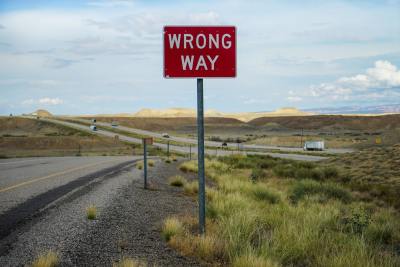The problem with talking about right and wrong

Perhaps the most helpful framework I know of in wrestling with moral issues comes from T.S. Eliot. Before we can know what to do with something, we must know what that something is for. For example, before we decide what we should do with human life (whether we should take it, make it, or remake it), we should know what human life is for.
The opposing sides of contemporary debates around bioethics, i.e. abortion, doctor-assisted suicide, in-vitro fertilization, and other assisted reproductive technologies, often proceed from very different beliefs about what it means to be human and, therefore, what it means for humans to flourish.
That, in essence, is the very important argument made by Notre Dame Professor O. Carter Snead in his new book What It Means to Be Human, which was recently called “the most important book of moral philosophy so far this century” by public intellectual Yuval Levin.
(Now, if you’ve already checked this off as too academic because of phrases like “moral philosophy” and “public intellectual,” my interview with Snead on the BreakPoint Podcast should change your mind.)
Our laws and policies and debates about beginning and end-of-life technologies are proceeding these days, says Snead, without a shared or articulated vision of “what it means to be human.” Or, to use T.S. Eliot’s framework, we are greenlighting incredible technologies and freedoms about how to begin life and how to end life without a foundation for understanding what humans are for.
Absent any official conversation, contemporary bioethics merely assumes the dominant cultural narrative about human existence: That we are autonomous individuals living in moral isolation from everything and everyone. As Snead profoundly argues, “everything” includes our own bodies. In other words, some of the most profound moral decisions are made as if people are “disembodied wills.” Philosopher Alasdair McIntyre put it simply, “We have forgotten our bodies.”
Here’s why that matters. If we aren’t bound by our bodies, then we aren’t bound by the bodies of others, which means we have no responsibility for anyone or for any obligations that are not chosen. No relationship, not with fellow citizens, not with family members or friends, not with tradition or religion, can define for us who we are or how we live.
This view of what humans are for, or perhaps what humans are not for, has been dubbed “expressive individualism,” and is the dominant worldview shaping our laws and our cultural imagination when it comes to what humans should do, and what we should be able to do with humans (including those not yet born, or who are infirmed and elderly, or who perceive themselves to be “born in the wrong body,” or who are fertile or infertile when they don’t want to be).
This caricature of real people and the way we live fails to take into account one of the most basic realities of human existence: That we live and encounter each other as bodies, not just as desires and wills. And our bodies are vulnerable. They are fragile. They get sick, and they eventually die. This reality creates mutual obligations within families, friends, and neighbors. Namely, to give without expectation of getting anything back and, also, this is important, to receive without being able to give back.
In What It Means to Be Human, Snead makes it clear that simply debating the morality of abortion, euthanasia, and assisted reproduction is not sufficient. Moreover, it’s not enough to train our kids or disciple Christians just in the morality of these issues. We have to ground our definitions, debates, and catechisms in anthropology, in what it means to be human.
If we are to love and defend our weak, vulnerable, and dependent neighbors, we ought also remember that we, too, will be weak, vulnerable, and dependent someday. This is what being human is, and our laws and policies should reflect it.
My interview with Professor Snead can be heard on the BreakPoint podcast. Please listen, and then buy two copies of What It Means to Be Human: one for yourself and one for your pastor. Both the Podcast and the book are available at BreakPoint.org.
Originally posted at breakpoint.org
From BreakPoint. Reprinted with the permission of the Colson Center for Christian Worldview. All rights reserved. May not be reproduced or distributed without the express written permission the Colson Center for Christian Worldview. "BreakPoint®" and "The Colson Center for Christian Worldview®" are registered trademarks of The Colson Center for Christian Worldview.
John Stonestreet is the President of the Chuck Colson Center for Christian Worldview, and co-host with Eric Metaxas of Breakpoint, the Christian worldview radio program founded by the late Chuck Colson. He is co-author of A Practical Guide to Culture, A Student's Guide to Culture and Restoring All Things.




















